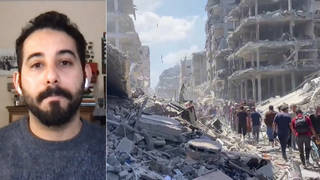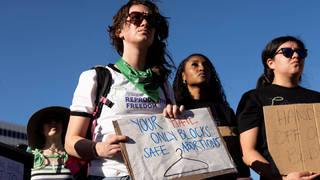
Related
Guests
- Tonya Lewis Leefilmmaker, author and advocate for women and infant health.
- Paula Eiseltaward-winning independent filmmaker.
With the overturning of Roe v. Wade, the battleground for abortion access now shifts to the states, even as the U.S. faces the worst rates of maternal mortality among all rich nations, with Black maternal mortality three to four times higher than the national average. Now a new documentary examines the crisis of Black maternal mortality through the families of two young Black women who died after giving birth. “Aftershock” is co-directed by Tonya Lewis Lee and Paula Eiselt, who join us to discuss how Black women navigate a healthcare system built against them and efforts underway to reduce racial disparities. “We know that Black women’s health and infants’ health is the marker of the health of a nation,” notes Lee. “In a system that puts profit over people, doesn’t listen and center birthing people already, Black women are even more affected by this due to the systemic racism that’s ingrained into our system,” adds Eiselt.
Transcript
AMY GOODMAN: This is Democracy Now!, democracynow.org, The War and Peace Report. I’m Amy Goodman.
As reproductive and abortion rights advocates in the United States continue to reel following the Supreme Court’s gutting of Roe v. Wade, the battleground for abortion access has shifted to the states. Public health experts are warning abortion bans will likely lead to more pregnancy-related deaths, with Black women and people disproportionately impacted.
The United States already has the highest maternal mortality rate of all wealthy nations. According to the Centers for Disease Control, Black women and people are three times more likely to die than white women and people during or after a pregnancy, due to racism and bias at hospitals and clinics, and chronic underlying conditions caused by inequity in the healthcare access.
Now a new documentary looks into the crisis of maternal mortality among the Black population, centering the stories of the families of two young Black women who died after giving birth here in New York City just six months apart from each other. They’re Shamony Makeba Gibson, who was 30 years old when she died of a pulmonary embolism in October 2019, 13 days after giving birth at Brooklyn’s Woodhull Hospital, and 26-year-old Amber Rose Isaac, who died April 2020 after an emergency C-section at Montefiore Medical Center in the Bronx. This is the trailer for Aftershock.
SHAWNEE BENTON-GIBSON: My daughter’s story is loud, colorful and artful.
SHAMONY MAKEBA GIBSON and OMARI MAYNARD: It’s a girl!
SHAWNEE BENTON-GIBSON: She was awake, aware and active.
SHAMONY MAKEBA GIBSON: Hey, baby.
SHAWNEE BENTON-GIBSON: And yet she still died.
OMARI MAYNARD: After she gave birth, Shamony was complaining that she had really sharp chest pains.
SHAWNEE BENTON-GIBSON: The ambulance came. I’m telling them the symptoms. “Is she on drugs?” Next set of people come in. “Is she on drugs?”
OMARI MAYNARD: They kept asking her mother: Is she on any drug?
SHAWNEE BENTON-GIBSON: I’m like, “Do y’all talk?”
OMARI MAYNARD: We waited a solid 12 hours.
JASMINE GIBSON: She’s gone.
BRUCE McINTYRE III: Black women are four times more likely to die than their white counterparts with the same symptoms. Why is that?
ANITA WARREN: This is a growing epidemic in our community.
OMARI MAYNARD: Hundreds and thousands of men are going through the same situation.
I’ve never lived in this house without her.
BRUCE McINTYRE III: You just got to keep pushing forward.
I can’t let Amber be another statistic.
NUBIA MARTIN: If these numbers were flipped around and white women were dying at the rate that Black women are dying, it would be a national crisis.
OMARI MAYNARD: We fight against maternal morbidity event by event in order to create change.
We can turn our pain into power and make something of this.
BRUCE McINTYRE III: Shamony Gibson! We hear you. We see you.
I planned on spending a lifetime with Amber. I wanted to give her my life. This way, I’m still going to.
SHAWNEE BENTON-GIBSON: The revolution will be tweeted, Instagrammed, Facebooked.
TOMI OJO: This fight is not over.
SHAWNEE BENTON-GIBSON: When Black mothers die, there’s a ripple effect. We called it “aftershock.”
AMY GOODMAN: That’s the trailer for the new documentary Aftershock, now streaming on Hulu, after it premiered at the Sundance Film Festival earlier this year.
We’re now joined by the co-directors, Paula Eiselt and Tonya Lewis Lee.
We welcome you both to Democracy Now! I’ve watched this film twice now, when it premiered at Sundance and again this weekend. What a powerful, devastating film, especially to come out now. Tonya Lewis Lee, talk about why you directed this film and the message, the story of these two women and so many others.
TONYA LEWIS LEE: Well, thank you for having us.
And, you know, it became clear that the Black maternal mortality rate is just going up. I mean, it’s going up for all of us in this country, but for Black women it’s getting worse. And, you know, I really wanted to tell the story of what was happening in the United States around Black women’s health. We know that Black women’s health and infants’ health is a marker of the health of nation. If mothers aren’t doing well, if infants aren’t doing well, none of us can do well. So, we need to figure out what the problem is and how to fix it. And that’s really the bottom line as to why I wanted to tell this story.
AMY GOODMAN: And tell us about these two women who you feature, sadly, posthumously, and speaking through their partners, the men who are now raising their infants that they died giving birth to.
TONYA LEWIS LEE: Yeah. Shamony Gibson was a beautiful, vibrant woman. You see a bit of her in the trailer. She had a daughter, Anari, and gave birth to her second child, Kahari, and died 13 days later from a pulmonary embolism.
Amber Rose Isaac, as you mentioned, died in April 2020. She had what is called HELLP syndrome, which is a very treatable condition that many pregnant women get, but, unfortunately, when she showed up to her doctor with symptoms of HELLP syndrome, she was dismissed. They did not listen to her. And unfortunately, by the time she had a C-section, it was too late to save her.
And it is clear that these women were loved women. They were loving women. And their partners, Omari Maynard, the partner to Shamony, and Bruce McIntyre, the partner to Amber, loved them so much. And through their grief — and what I’ve learned from these families is that grief really is an expression of love — through their grief, they’ve become activated to improve outcomes for all of us. And they’re doing amazing work. Omari is a painter. He paints portraits of other women who have passed away. He reaches out to the other fathers when they lose a partner from childbirth complications, to offer support. And that’s how we met Bruce McIntyre, because Omari reached out to Bruce when Amber passed away. And then Bruce has just been working on legislation to make for birthing centers that can have midwives as front-facing and to bring a birthing center to the Bronx. They’re amazing men doing great work for all of us.
AMY GOODMAN: I want to go to another clip from your film, Aftershock. This is Shawnee Gibson, the mother of Shamony Benton-Gibson, who died two weeks after giving birth, and Shamony’s partner, who you were just talking about, Omari Maynard, as well as her sister, Jasmine Gibson. We hear first from Shawnee, her mom.
SHAWNEE BENTON-GIBSON: She ended up with a C-section.
SHAMONY MAKEBA GIBSON: My baby. My baby that I’ve been waiting forever for.
UNIDENTIFIED: You did amazing, Shamony.
OMARI MAYNARD: So we leave the hospital. Within the first week, she was complaining about having shortness of breath when she talked.
JASMINE GIBSON: She walked down the stairs to get something. And when she was trying to get back up, she couldn’t move. Like, she was just — she had to just lay on the floor for a while.
OMARI MAYNARD: We called the hospital, told them what the symptoms were. The doctor said, “You know, it’s OK. Just relax.” That proceeded for the next two weeks. We go back to the hospital for Shamony so that they can remove her staples from her C-section. Again told them what the symptoms were, asking what are some things that we can do. And, you know, their answer pretty much was the same every time: just make sure that she rests. There wasn’t much of a sense of urgency on their part at all.
SHAWNEE BENTON-GIBSON: That’s the expert. I’m not a doctor, so, OK, I rallied people to make meals for her. I did what we do, just take care of her.
OMARI MAYNARD: Two weeks after she gave birth, Shamony was complaining that she had really sharp chest pains. She says, “I want to go to the hospital now.” Her mom and her aunt were in the back with her. And as I’m packing the bag, I just hear them screaming and screaming, “Omari! Omari! Come in here! Come in here!” So I run in there, and then I just see Shamony is — she’s just in shock.
AMY GOODMAN: So, that’s a clip from Aftershock. Paula Eiselt, you’re the other director of this film. I mean, what we get from this film is that these women just didn’t go into shock, they were complaining that they were experiencing problems. Talk about why the maternal mortality rate is so much higher in the Black community, this issue of being heard, of taking their pain seriously.
PAULA EISELT: Yeah. You know, our birthing system and our maternal health system is like no other country. We’re the only country in the industrialized world that does not have midwives integrated into our system, and our rates correlate to that. The other countries that have midwives, their mortality rates are much, much lower.
And I mention that because midwifery is human-centered care. That’s the philosophy of midwifery, is that a pregnant person, a pregnant woman, she knows her body best, and she comes first. And in midwifery care, women are seen and heard much more than in the hospital system, where, you know, it’s not a shared decision-making model, as Helena Grant in our film says. So, in a system that puts profit over people, doesn’t listen and center birthing people, already Black women are even more affected by this due to the systemic racism that’s ingrained into our system.
And actually, it’s that racism that is the reason why we don’t have midwives, because at the turn of the 20th century, white men decided they were going to take over the maternal health system and launched a really successful marketing campaign against midwives, specifically Black midwives, saying they’re dirty, they’re untrained, babies are dying because of them, and really pushed midwifery out of the way, in a way that no other industrialized country has. So we essentially don’t have that level of care here, and it’s because of that racist campaign that got us here.
AMY GOODMAN: I want to go back to Aftershock. This is Shawnee Benton-Gibson, the mother of Shamony, who died two weeks after giving birth, speaking at a rally in Washington, D.C.
SHAWNEE BENTON-GIBSON: Black lives matter, but Black wombs create Black lives. And when we forget that, we forget our humanity. We want to make sure that our grandbabies, our children have mothers to raise them and that fathers are not left to figure it out on their own. We must stop this. Black lives matter because Black wombs matter! Black lives matter because Black wombs matter! Black lives matter because Black wombs matter! And a Black womb created you!
AMY GOODMAN: That is Shawnee Gibson. Her daughter, Shamony, died after childbirth, just a few weeks later. Tonya Lewis Lee, can you talk about C-sections, cesarean sections, and their relation to this higher death rate — not that you condemn women getting C-sections who need them — the hospital’s incentive for performing a cesarean section even when it’s not necessary?
TONYA LEWIS LEE: Yeah, absolutely. First of all, I want to say C-sections are really important. They save lives. And at the same time, though, C-sections are major surgery. C-sections are major surgery. It’s not just a simple thing. And when you have one C-section, it sort of puts you in a position to have another C-section and other complications. And unfortunately, in the United States, the rate of C-sections has gone up over the last 25, 30 years. And we’ve seen the maternal mortality rate go up alongside it.
And unfortunately, what happens in our birthing system here in the United States, when we’re surrounded by OB-GYNs — and they are surgeons, and they are important. We need them. Paula was just talking about midwives. Midwives can do just about anything a doctor can, except for cut you. Right? So, I just want to say that. But the thing about the C-section rate is, you know, we really need to be careful about how we are applying C-sections.
What happens is, we induce women to get them going, and then it doesn’t move along fast enough, and you’re pushed into a C-section. C-sections take less time. They cost less money, but they are reimbursed more by the hospitals than a natural, spontaneous vaginal birth. Vaginal birth takes a long time. The regular spontaneous birth is a process that takes a long time. It’s OK. It’s healthy. It’s the way our bodies were built. If we can go through that process of natural birth, it just — it costs more, and hospitals don’t necessarily want to pay for it.
But I think, in general, we really need to think about in this country how we’re birthing. Is it really about hurrying up and getting that baby out, or is it about allowing a woman’s body to do what it’s supposed to do so that she can bring forth this baby in the time that she’s supposed to be doing it, in the safest way possible?
AMY GOODMAN: Paula Eiselt, in the film, you have a expectant mom, Felicia Ellis, from Tulsa, Oklahoma, saying a Black woman having a baby is like a Black man at a traffic stop with police. In Oklahoma, the maternal mortality rate — Black maternal mortality rate is double the national average. Talk about this and the Momnibus bill in Congress.
PAULA EISELT: Yeah. And you mentioned —
AMY GOODMAN: And we have 30 seconds.
PAULA EISELT: OK. So, the Momnibus bill — set of bills in Congress would be the largest investment in maternal health, specifically Black maternal health, in this country. It would improve access to midwives, as we spoke about before; increase the complete perinatal workforce; create more culturally congruent care, so that’s allowing more Black midwives into the space and more educational trainings. It would extend postpartum coverage throughout the country. Right now Medicaid in some states only cover up to six weeks, and we know that women can die up to one year postpartum. So, that collection of bills would do a tremendous amount to cut down this mortality rate and improve birthing for all American women.
AMY GOODMAN: Paula Eiselt and Tonya Lewis Lee, a fantastic film, co-directors of the new documentary, Aftershock, now streaming on Hulu. I’m Amy Goodman. Stay safe. Wear a mask.












Media Options